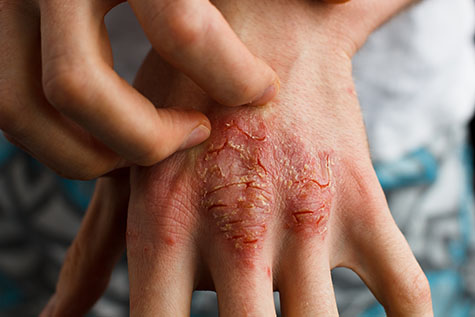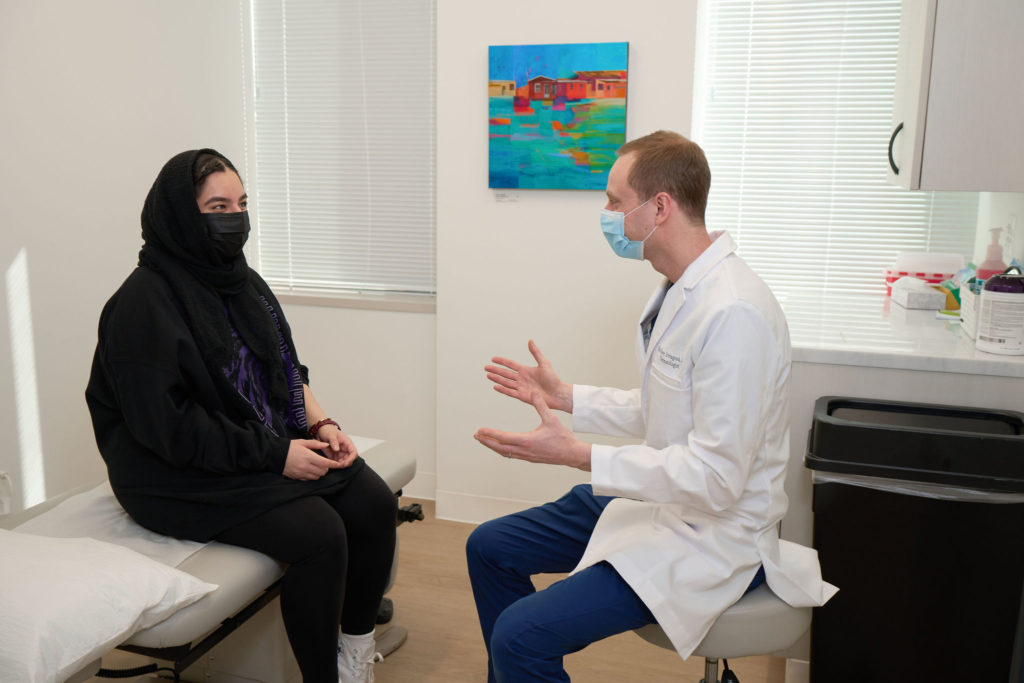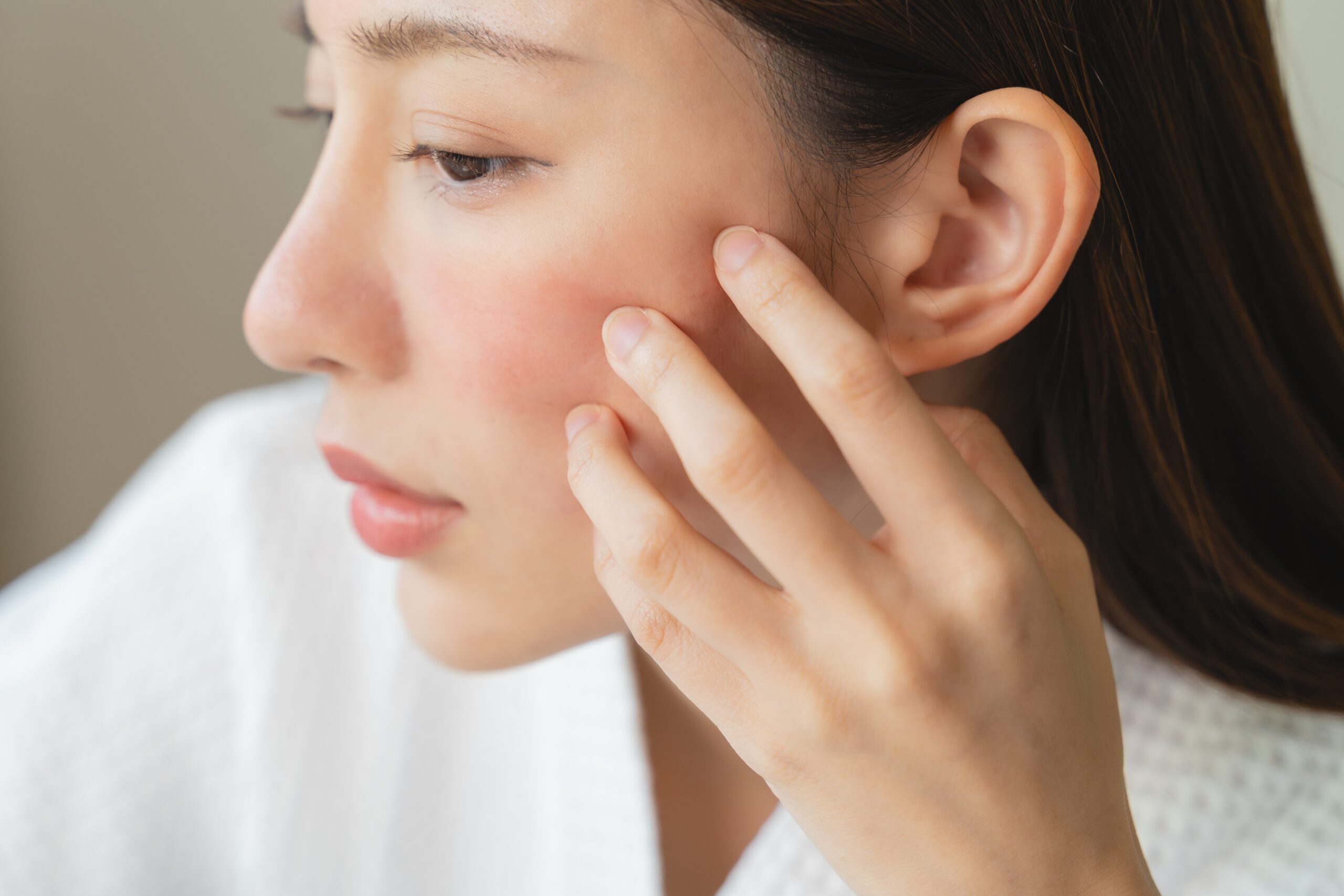What Causes Eczema?

The causes of eczema are believed to include:
- Genetics
- Autoimmune response
- Skin irritants
Atopic dermatitis, an eczema that begins at childhood, tends to be related to allergies and asthma. If you have eczema, you also likely have triggers for flare ups.
What Types of Eczema Are There?
There are many types of eczema, which are categorized by specific symptoms. These include:
- Atopic dermatitis
- Dyshidrotic eczema
- Hand eczema
- Nummular eczema
- Stasis dermatitis
Who Gets Eczema?
Both children and adults may have eczema. However, most infants or children who have the condition from an early age outgrow it by around age four or five.
Even if you never had eczema as a child, you may develop the condition later in life. Most adult-onset eczema occurs in your 50’s, but anyone of any age can develop new-onset eczema.
Finally, you are more likely to have eczema if you also suffer from allergies or asthma or if you have a family history of eczema.
How Can I Prevent Eczema?
Eczema flare-ups can be prevented by maintaining your skin’s moisture and avoiding your triggers. Your dermatologist can help you identify triggers, and you can keep a journal or list of potential triggers as you notice flare-ups. Common eczema triggers include:
- Irritants such as fragrances, household products, dyes, etc.
- Allergens, including environmental, seasonal, and food allergens
- Stress
- Extreme hot or cold temperatures
Why Treat Eczema?
Eczema can induce persistent and bothersome itching and leave behind darkened or pink dry patches. Without the help of a dermatologist, it can be difficult to control eczema flare-ups and prevent breakouts in the future.
How Can I Treat Eczema?

A board-certified dermatologist at Arlington Dermatology will create a treatment plan for your eczema tailored to your age, the subtype of eczema, and specific symptoms. Depending on your case, your board-certified dermatologist at Arlington dermatology may recommend a gentle skincare routine, light therapy (nbUVB), topical medications, or systemic medications (oral or injectable) to reduce flare-ups and prevent new ones. Our providers are very experienced with prescription medications for eczema including topical steroids, non-steroidal anti-inflammatories, pills, or injectable medications such as Dupixent, but will also utilize non-prescription management. Maintenance and flare prevention are also important and our board-certified dermatologists will help you identify your eczema triggers and explain how you can best avoid them.

Eczema FAQs
How long does eczema last?Eczema can vary widely in duration; some individuals experience flare-ups that last for days or weeks, while others may have chronic symptoms that persist for months or years. Treatment can help manage and reduce flare-ups, however, there is no cure for this condition and symptoms may recur with or without treatment. Is Vaseline good for eczema?Vaseline, or petroleum jelly, is an excellent option for eczema as it provides a protective barrier that locks in moisture. You may also use Aquaphor, a similar product to Vaseline, but be aware it contains lanolin, a wool-derived product, for those who have allergies to wool. Why is eczema so itchy?Eczema is often itchy due to skin inflammation and dryness. The condition disrupts the skin barrier, making it more sensitive and reactive. However, scratching promotes the itch-scratch cycle that is difficult to break, so when itchy flares do pop up, instead of scratching, try applying an ice pack wrapped in a towel or moisturizing with a thick cream. Can eczema be caused by stress?Yes, stress is a known trigger for eczema flare-ups. Managing stress through relaxation techniques and lifestyle changes can help improve symptoms. Can Eczema turn into psoriasis?Eczema and psoriasis are separate and distinct skin conditions, but they can share similar symptoms. Eczema does not turn into psoriasis, but some individuals may have both conditions at different times or the same time. Does eczema get worse in the winter?Many people find that eczema worsens in the winter due to dry air and indoor heating. Moisturizing regularly and using a humidifier can help alleviate symptoms during colder months. What does eczema look like in adults?In adults, eczema often appears as red, inflamed patches of skin that may be dry, scaly, or cracked. The affected areas can be itchy and may appear on various parts of the body, including the hands and elbows. Where is eczema most common?Eczema is most common in children but can occur at any age. It often appears in skin folds and areas like the elbows, knees, and face but can also affect other body parts. Does eczema go away on its own?While some individuals may experience resolution of eczema as they age, others may have ongoing symptoms that require management. Regular skincare and avoidance of triggers can help control flare-ups. What is considered severe eczema?Severe eczema is characterized by widespread, intense itching, extensive redness, and significant skin damage. It may interfere with daily activities and may require more intensive treatment approaches. |
Schedule an Appointment
If you’re struggling with eczema, a board-certified dermatologist at Arlington Dermatology can help find a solution for you. Rather than suffering through a persistent itch-scratch-itch cycle, visit a qualified, experienced dermatologist to resolve flare-ups and prevent them in the future.
To schedule an appointment with Arlington Dermatology, please call our office or request your appointment online.




